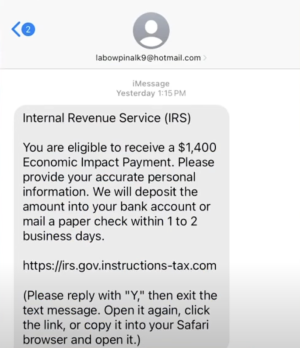This "IRS $1,400 rebate" text could be a trap—here’s how to spot and avoid the latest scam!
By
Veronica E.
- Replies 0
In today’s world of instant messages and surprise offers, it’s easy to get excited when a text claims you’re entitled to an unexpected $1,400 rebate.
After all, who wouldn’t welcome a little extra cash?
But before you start thinking about how to spend it, take a moment—because this could be a scam designed to steal your personal information.
The Better Business Bureau (BBB) has issued a warning about a new scheme where scammers pose as the IRS, hoping to trick unsuspecting individuals.
Unfortunately, many people have already fallen victim, losing not just money but also sensitive personal details.

Picture this: Your phone pings with a message claiming the IRS is sending you a $1,400 stimulus check.
It even references recent news about legitimate payments to those who missed out on previous stimulus funds.
It seems official—but here’s the truth: The IRS does not send texts about rebates, and any real payments are processed automatically without requiring any action from you.
This scam is a textbook phishing attempt.
Fraudsters create a false sense of urgency, luring victims into clicking on a fake IRS website.
That link could either install malware on your device or trick you into handing over sensitive personal and financial information.
Here at The GrayVine, we believe in using wisdom and experience to stay ahead of these threats. Here’s how you can protect yourself:

To stay one step ahead, keep these key tips in mind:
Staying informed is your best defense against scams like these.
By recognizing the warning signs and sharing this information with others, you can help protect yourself and your loved ones from falling victim.
Related articles:
Are you eligible for a $1,400 stimulus? Find out if the IRS excluded you!
Don't fall for this USPS text scam—protect yourself before it's too late!

Have you ever received a scam message that seemed too real to ignore? Do you have advice for spotting these frauds? Share your experiences in the comments below—we’d love to hear your thoughts and help others stay safe!
Read next: The Safeway dilemma: Unraveling the theft issue behind San Francisco's store closure
After all, who wouldn’t welcome a little extra cash?
But before you start thinking about how to spend it, take a moment—because this could be a scam designed to steal your personal information.
The Better Business Bureau (BBB) has issued a warning about a new scheme where scammers pose as the IRS, hoping to trick unsuspecting individuals.
Unfortunately, many people have already fallen victim, losing not just money but also sensitive personal details.

Scammers are posing as the IRS, sending fake texts about a $1,400 rebate—don’t take the bait! Image Source: Pexels / SHVETS production.
The Scam That Plays on Hope and Trust
Picture this: Your phone pings with a message claiming the IRS is sending you a $1,400 stimulus check.
It even references recent news about legitimate payments to those who missed out on previous stimulus funds.
It seems official—but here’s the truth: The IRS does not send texts about rebates, and any real payments are processed automatically without requiring any action from you.
This scam is a textbook phishing attempt.
Fraudsters create a false sense of urgency, luring victims into clicking on a fake IRS website.
That link could either install malware on your device or trick you into handing over sensitive personal and financial information.
How to Spot and Avoid This Scam
Here at The GrayVine, we believe in using wisdom and experience to stay ahead of these threats. Here’s how you can protect yourself:
- Verify Before You Trust – The IRS only communicates through mailed letters, never through texts or emails. If you get an unexpected message, be skeptical.
- Avoid Clicking on Links – Even if a text looks legitimate, never click links. Instead, visit the official IRS website by typing “IRS.gov” directly into your browser.
- Pause Before Acting – Scammers want you to panic and respond quickly. Take a step back and think before engaging with any suspicious message.
- Report Suspicious Messages – If you receive a scam text, don’t just delete it. Forward it to [email protected] and report it to BBB.org/ScamTracker. Your report could prevent someone else from falling victim.

Watch out for texts like this—scammers are impersonating the IRS to steal your personal information. Image Source: YouTube / wgaltv.
Also read: When cash meets cashless: A $10 bill encounter that sparks a larger conversation
The GrayVine Guide to Protecting Yourself from Scams
To stay one step ahead, keep these key tips in mind:
- Stay Informed – Regularly check resources like the BBB Scam Tracker and the IRS website for updates on common scams.
- Keep Your Information Private – Never share personal details like your Social Security number, banking information, or passwords in response to an unsolicited message.
- Trust Your Instincts – If something doesn’t feel right, it probably isn’t. When in doubt, consult a trusted source.
- Warn Others – Talk to friends and family about these scams. The more people know, the harder it is for scammers to succeed.
Staying informed is your best defense against scams like these.
By recognizing the warning signs and sharing this information with others, you can help protect yourself and your loved ones from falling victim.
Related articles:
Are you eligible for a $1,400 stimulus? Find out if the IRS excluded you!
Don't fall for this USPS text scam—protect yourself before it's too late!
Key Takeaways
- Taxpayers are being warned about a scam involving text messages falsely claiming they are eligible for a $1,400 stimulus check from the IRS.
- The Better Business Bureau cautions that the IRS doesn’t send such texts and advises against clicking on any links in these fraudulent messages.
- The scam is a phishing attempt designed to collect personal and financial information by impersonating the IRS.
- The Better Business Bureau provides tips on verifying official communications, avoiding links in unsolicited messages, recognizing urgency as a red flag, and reporting scams to the appropriate authorities.
Have you ever received a scam message that seemed too real to ignore? Do you have advice for spotting these frauds? Share your experiences in the comments below—we’d love to hear your thoughts and help others stay safe!
Read next: The Safeway dilemma: Unraveling the theft issue behind San Francisco's store closure






